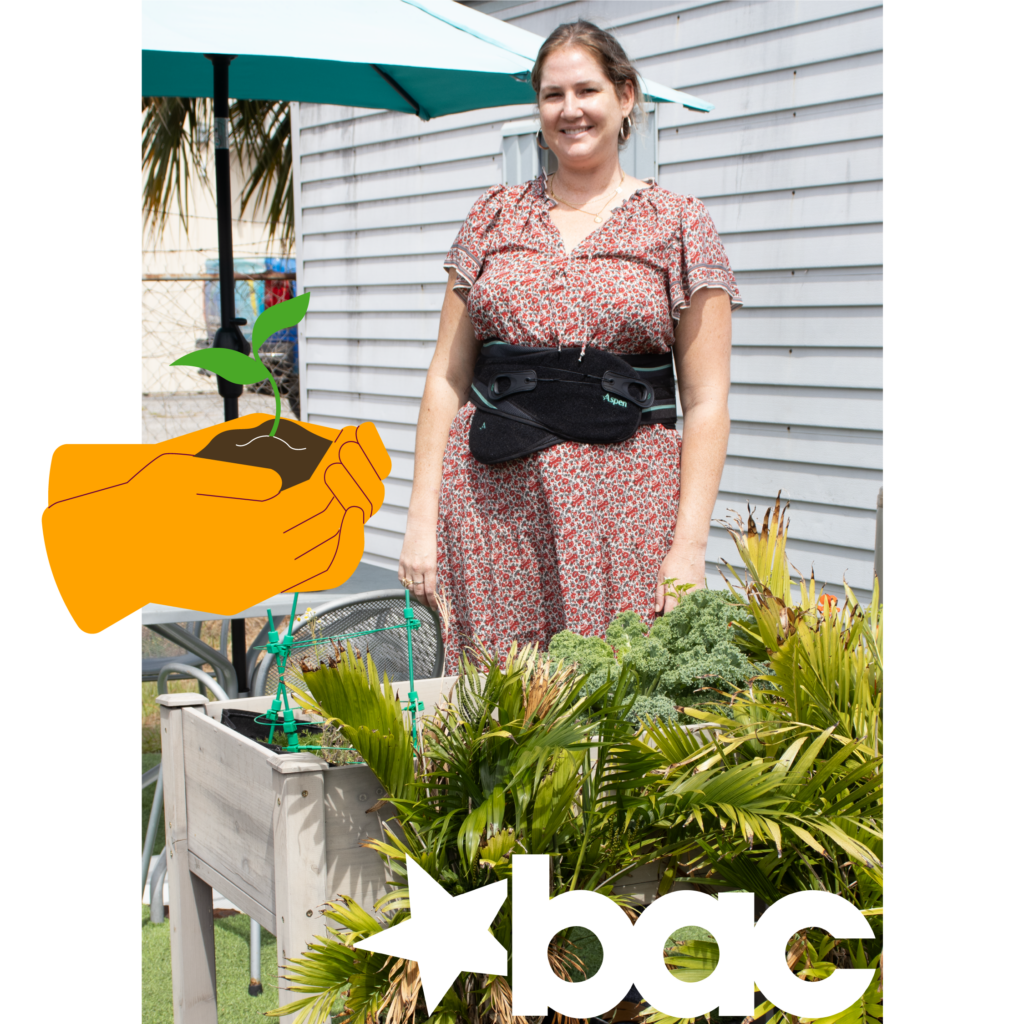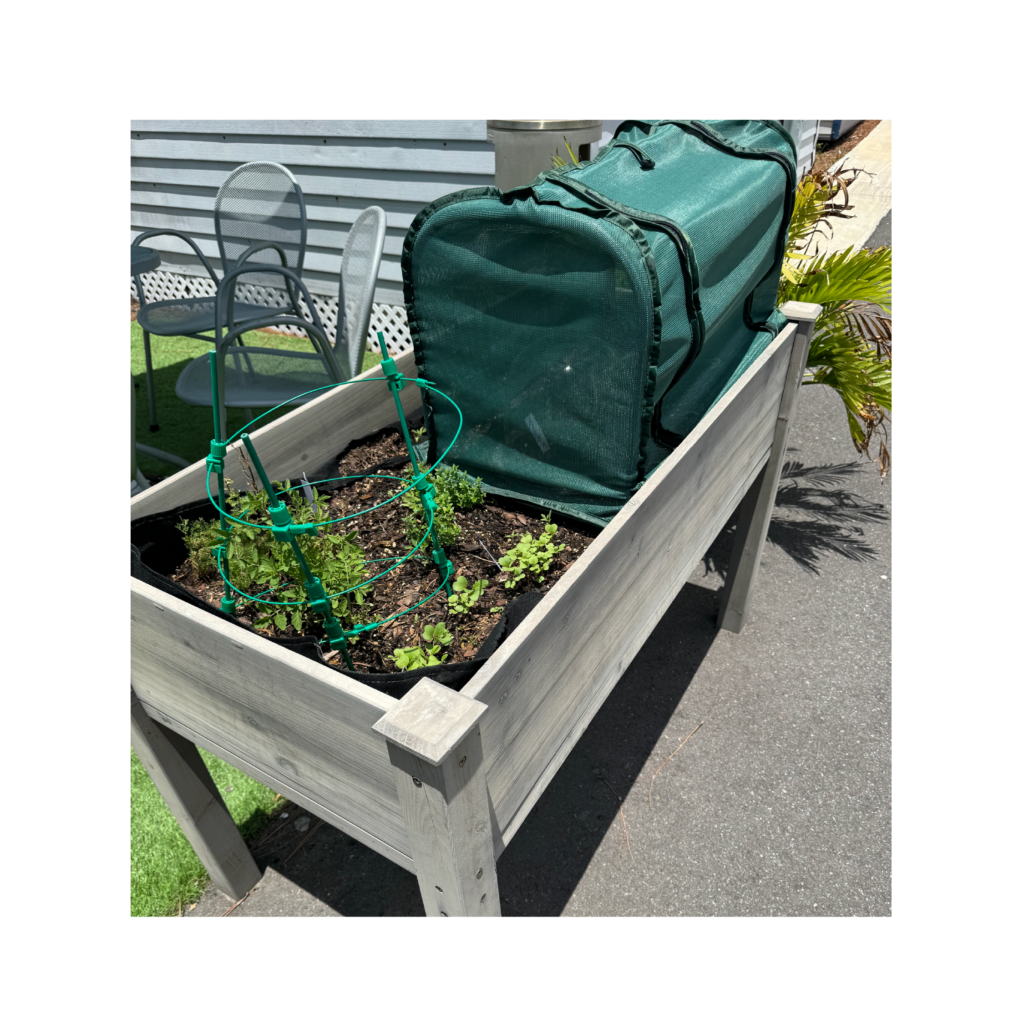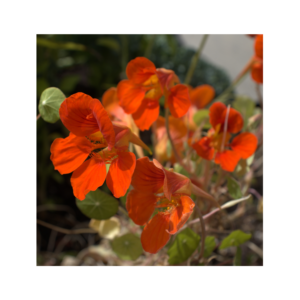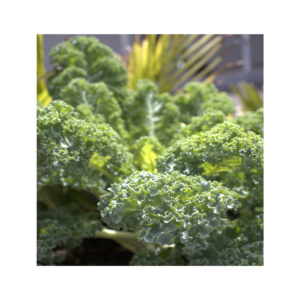
Meet Natalie, our local green thumb. While attending University of North Florida, Natalie worked as a farmer for Ogier Gardens where she learned about sustainable and organic farming practices. The UNF Ogier Gardens promotes healthy living and sustainability through educational programs and fresh produce. They offer workshops, volunteer opportunities, and donate fresh produce to the UNF Lend-A-Wing pantry. She later gained experience working as an organic market manager for Rockledge Gardens. Her passion continued with attending lectures from Brevard Tropical Fruit Council, and from reading John Jeavons’ book, How to Grow More Vegetables. Natalie has brought this knowledge to BAC and is currently working as part of one of our Ability-One contracts as a Customer Service Representative. Natalie creates value not only for our customers but for participants and co-workers alike.
Upon walking the corridors you’ll see a raised garden filled with luscious greens, cherry tomatoes and edible flowers. The edible garden is planted based on the seasons and is sustainably planted. Employees are welcome to harvest the garden; as long as they leave some for one-another.
Accessible Gardening for Everyone

Raised garden beds are a fantastic way to make gardening accessible to everyone, regardless of mobility limitations. Here are some of the benefits of raised gardens for accessibility:

- Reduced bending and reaching: Raised beds eliminate the need to bend or stoop to tend to your plants, making gardening more comfortable for people with back pain or limited mobility.
- Wheelchair accessibility: Raised beds can be built at a height that allows people in wheelchairs to easily reach all parts of the garden.
- Easier weeding and pest control: The raised structure makes it easier to see and reach weeds and pests, making it simpler to maintain your garden.
If you’re interested in creating a raised garden for accessibility, there are a few things to keep in mind:
- Height: The ideal height for a raised garden bed will vary depending on the individual’s needs. A good starting point is 24 inches for someone who uses a wheelchair and 30 inches for someone who will be standing while gardening.
- Width: The width of the bed should be narrow enough to reach the center from either side. A good rule of thumb is to keep the width between 3 and 4 feet.
- Pathways: Create wide, stable pathways around the raised bed to allow for easy maneuvering of wheelchairs or walkers.
Environmentally friendly and sustainable gardening tips from our local green-thumb:
- Water Wisely
Install a rain barrel to collect rainwater for watering your plants. Choose native plants that are adapted to your climate and require less water. Avoid overwatering container gardens, which can lead to disease and kill plants.
- Reduce Energy Use
Sharpen your lawnmower blades for efficient mowing. Pull weeds by hand instead of using a gas-powered weed whacker. Prune dead debris to prevent pest infestations. Use solar lighting instead of fluorescent lights.
- Embrace Companion Planting
Plant beneficial companions together to deter pests, attract pollinators, and improve plant health. This natural approach can save time and resources in the long run.
- Explore Lunar Planting (Optional)
The Old Farmer’s Almanac Planting Calendar can guide your planting based on the moon phases. Planting during specific lunar phases is said to promote better plant growth.
- Minimize Fertilizer Use
Test your soil to determine the amendments your plants need. Use organic fertilizers and compost to nourish your plants while protecting the environment. Consider creating your own compost pile to reduce waste and create nutrient-rich fertilizer.
- Save Seeds for Future Planting
Collect seeds from your plants to save money and ensure you have varieties you love. Join a local seed bank to connect with other gardeners and share seeds.
- Use Groundcovers or Mulch
Suppress weeds and prevent erosion with a layer of groundcover or mulch. Native groundcovers add beauty and benefit the local ecosystem.
- Keep Learning and Experimenting
There’s always more to learn about eco-friendly gardening. Join a local gardening club or book club to connect with other enthusiasts. Visit your local library or farmer’s market for resources and inspiration.
Interested in learning more? Natalie has highlighted some great ways to get started:
- Join the book club at Rockledge Gardens or email them at info@rockledgegardens.com
- Visit your local library for helpful literature
- Ask a family, friend, or community member about their garden
- Visit your local farmer’s market
- Join a garden club
- The Brevard Tropical Fruit Council is a great resource for growing fruit trees and maintaining them responsibly!
Summer Rolls
Enjoy this summer roll recipe inspired by our garden!
Ingredients:
- 8-16 Sheets of rice paper
- 1 large carrot
- 1 Merritt Island Mango (slice thinly)—Take a drive down South Tropical Trail and visit a fruit farm like Ensey’s Tropical Fruit starting in June (seasonal)
- 1 C Cabbage
- 1 Small Cucumber
- 1 Small Bell Pepper
- Lettuce Leaves (Kale, Collard Greens, etc.)
- Handful of mint
- 1 Avocado
- Peanut Sauce
Preparation:
- Prepare your rice paper—place in a shallow dish with water until pliable. Add second paper on top following same directions. Remove from water and place on cutting board/prep surface.
- Lay greens flat on surface of rice paper. Stack all the veggies, mango and mint so you use 1/8 of the ingredients per roll. Leave about ½ on each end of empty paper.
- Roll like a burrito starting at one end then finishing on the other.
- Eat shortly after prepared and use peanut sauce for dipping
